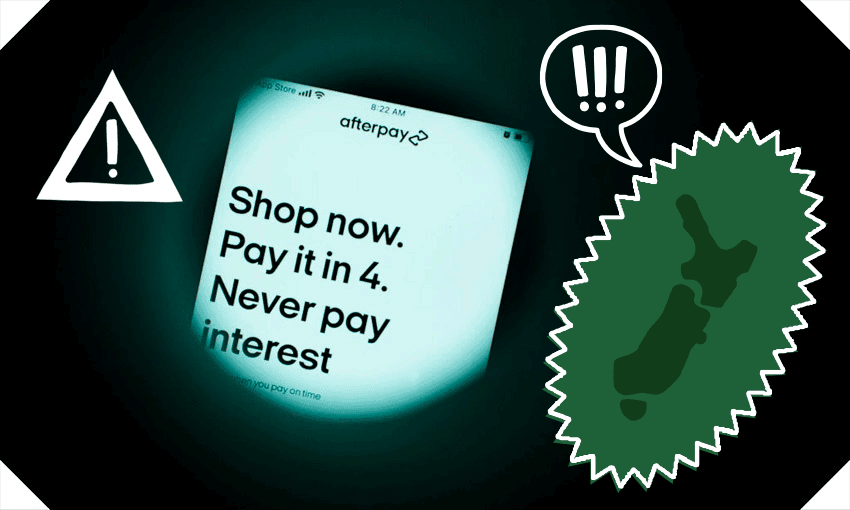The government is moving forward with plans to stop ‘vulnerable’ consumers falling into debt traps.
Most of us have been there: perusing the never-ending online mall and thinking to ourselves “Could just Afterpay it.”
Buy now, pay later schemes like Afterpay have become widespread in recent years. While Afterpay is just one example – there’s also Laybuy, Zip and Humm, among other schemes – it’s a name that’s almost become synonymous with the world of online shopping. You can now access practically everything from food to clothes, event tickets and flights via the handy – but potentially dangerous – trap of four interest-free instalments. There were numerous headlines earlier this year after a bottle store announced it would be introducing Afterpay (a proposal it quickly backed down on).
But with the growth of buy now, pay later schemes has come a rise in concerns that low income New Zealanders could be falling into debt traps. It’s easy to click on an Afterpay link and forget that in a fortnight you will have to pay again – or risk the fees that come with late payment.
Now, the government has followed through on its plans to help protect more vulnerable New Zealanders.
So what has been announced exactly?
There’s not a lot of detail, but the lowdown is this: you can soon expect affordability checks on certain buy now, pay later loans.
According to the commerce and consumer affairs minister David Clark, loans of $600 or more will come with the same types of protections offered to borrowers that use credit cards and personal loans.
Currently, providers of buy now, pay later schemes are able to skirt around the legislation New Zealand has in place for regular credit providers. The government is hoping that by tightening up the existing law it will force companies like Afterpay to abide by the same rules as regular lenders.
What will that involve?
A couple of options are on the table at this stage. The Ministry of Business, Innovation and Employment will now seek feedback on two options for what affordability assessments will be required. It will either involve a full affordability assessment in line with the Credit Contracts and Consumer Finance Regulations Act. (As a former law student, the name of this legislation haunts me.)
A slightly less intense affordability assessment is also being considered – that would be based on “reasonable inquiries” into the affordability of the loan.
Smaller loans, under the threshold limit, will not have to go through the same process, but “comprehensive credit reporting” will need to occur.
In short, it’s hoped this change will stop users of buy now, pay later schemes from being able to take on unrealistic debt. However, it will still be far looser than the requirements in place for people seeking to get a credit card. You won’t need to prove your income or ability to pay back debt in order to make an account on a platform like Afterpay.
You can expect to see these changes in place sometime next year.
Why is the government doing this?
Minister Clark, in his own words, simply said it’s simply “the right thing” to do.
“As the global cost of living crisis puts pressure on New Zealanders and their families, we are taking action to help them avoid unmanageable debt, especially as the Christmas season looms,” said Clark. “While for many, [buy now, pay later] can be a useful way to spread the cost of large household purchases, we are trying to stop vulnerable people getting into a spiral of debt if lenders allow them to take on more than they can afford.”
Is this a problem worth fixing?
Yes. Earlier this year it was reported that nearly 9% of all buy now, pay later accounts were in arrears, meaning 9% of users were racking up late fees on their purchases. It might not the same as accruing interest on a credit card, but it can easily make existing debt spiral further out of control. There’s also the issue of people using their credit cards to pay off buy now, pay later debt (about one in five people do this).
There are over half a million users of these platforms in New Zealand – a number that’s growing. While the government won’t want to piss them off by changing the schemes too much, that’s a lot of people potentially taking on debt they can’t pay off.
How long have tighter regulations been called for?
Last December, Ngā Tāngata Microfinance, Sorted.org.nz and four other organisations in the financial capability sector teamed up on a campaign encouraging people to “spend safely” before Christmas. It followed concern about the uptake of buy now, pay later.
“If you’re on a low income and actually making a purchase that over six weeks is going to cost you $20 a week, have you actually considered [whether] next week you’ll still have $20 available?” questioned Ngā Tāngata’s Natalie Vincent.
Meanwhile, in an interview with Stuff, financial mentor Jeremy Cooper said he couldn’t understand how lower income people were able to easily open multiple buy now, pay later accounts, providing them with thousands of dollars they might be unable to repay.

